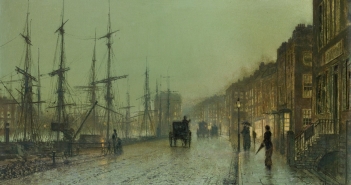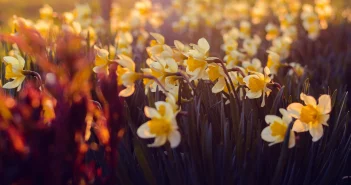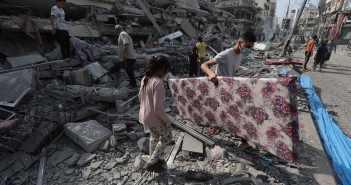His blue look was on the ground, as though it held the reason for the last five minutes. She took him all in. The hair was wavy on top and cropped tight at the sides, sprinkled grey. He looked down at her on the step. Are you ok?
My hero? she ventured.
From her seat on the steps in the archway, she watched the rain come fast and heavy on the lane.
He laughed, lowered his head and folded his arms, looked at his shoes then at the rain, searching for the next thing to say.
We should bring you to the hospital.
No, she said. No hospital.
The steps led up to what looked like two apartments with dark, imperious doors. Across the lane, the open back door of a commercial kitchen, wheezing steam, chattering work and a churning smell of Italian food mingled with the food bins parked by the door. The rain was the type that felt like God tipped over the sky and the blue was washing away. She loved it. She wanted to ride down a newborn river crashing through the buildings, forests, mountains, meat till she reached the ocean and swallowed it. But she had just been hit by a car so instead, she wanted her seat.
Do you live near here? he said, biting his lip.
He sure wore that black suit.
Sorry I slapped you, she said.
Ah, he waved his hand. You were in shock.
Ask me the next thing.
Are you drunk? he said, smirking.
No. I just want to go home.
It’s just I saw you in the restaurant –
I want to go home.
I’ll take you.
No, she said, trying to rise.
She stopped because she lacked the strength, so she concealed it by instead shifting to fish out her purse from underneath her.
Were you drinking? he pursued, worrying his lip again.
Ignoring him, she lit a cigarette, and blew a drag at him, careless, spent. With something like tiredness, her long lashes closed slow and long on him. She felt languorous, suspended for an unknown interval, free and anonymous on a step behind the rain. Her head rested on the wall.
A pack of girls in hotpants skittered trilling and swearing through the alley like a fuckle of turkeys, their jackets held high over their heads as umbrellas. Celine could taste blood on her tongue.
Gimme one a’those, will ya? he said, dabbing his face dry with the cuff of his jacket.
His finger grazed hers when he took the packet – a shock of intimacy worse than his manhandling when he cowboyed her clear of the road, away from the traffic and chaotic onlookers. Snatching her lighter from the air between them where she threw it, he moved closer. Her palm massaged the hip that caught the bumper. The car that hit her threw bawls of abuse out the window, taking her for drunk as well. It struck her how much taller than her her rescuer was when he was close, the way trees get taller when you walk toward them.
So what are you fallin’ all over the place for? he said, squinting down at her.
Fuck off, she said, quietly.
He laughed. Is it your birthday or something?
She looked at him.
Well, you’re all decked out in leopard print and silk and eating alone in a restaurant. And falling all over the place drunk.
I’m not drunk, she said, emphatically flat.
Really? he smirked.
And I’m not engaging your asshole-ishness either because if I do collapse and start spitting up blood you’ll know I’m not drunk and that yes, you tool, I have a condition. Tachycardia.
I don’t care.
Jesus.
Because you’re just so fucking beautiful I can’t think of anything else.
She laughed, a great blart of a belly laugh.
Fuh – I haven’t laughed like that in a while, she said.
Well at last, he beamed, A fuckin’ smile outta ya.
You think this is funny?
I do, a bit, yeah.
She spiked him an awful look.
He retreated and exhaled, letting the air flupper his lips like a horse.
The rain was thunderous on the cobblestones and rooftops.
And I’m not a l-lady, she stammered, I’m a strong woman. I’ll take it from here.
I’m Bob by the way.
Ya. Call me a taxi, will ya?
I can drive you.
No.
Bob followed Celine’s taxi in his car without her knowledge. It brought her through Shantalla and dropped her at the University Hospital. The night was dirty green and umber with trees and street light. He parked outside Mr. Waffle and watched her in the mirror walking away from him toward the building where she was born.
He shadowed her to the ICU. In an open plan of a dozen beds, she rounded a corner and was gone. Staying hidden, he spied out from the corner and saw her. Four beds down, stopped at the one near the window. The bed contained a small figure, a child.
As she faced the bed with slumped shoulders, Celine’s expression was sombre. Her heart separated through water. She stood still at the foot of the bed and raised a hand to her mouth.
You won’t let me leave, wee one, she whispered to her fingers.
The child’s small, closed eyes, with the tubes up her nose and down her mouth. Her daughter hooked up to the Matrix, and not the Ribbon, where it was easier to spend time with her. Celine softly traced a curl on the sleeping forehead. With soundless poise, she placed herself on the plastic grey seat next to the head of the bed, and lightly rested her hand on the bedspread. The night drank the place down. Beyond the window, it painted with hate.
You can’t out-G me, she said to it. I’ll hate you dead.
She wished she knew what she thought. In that moment she was blessed with the truth that it was not possible to know anything, not even that you didn’t know, because you often did and had no excuse. And what did knowing and not knowing at the same time do to each other? Give birth to something, anything you wanted. She wanted freedom. In that moment, she had it. But the guilt of having it swept in to rob her of it. Nothing after nothing, and she was herself again, for the first time that day, without self, nobody, happily, with all the answers and no way or wish to convey them. She was without her body, left with a voice that would not speak, wiser than her and uncontrollable until the time called for it, and it just came to cut through the ugly and vulgar. She almost worshipped it. She hesitated to call it truth, in case it taught her a lesson in manners about labelling and chose never to speak to her again.
Christ, anything but that, she prayed.
No, it wasn’t gone. It would hold its peace. It would hold all the pieces.
Maybe it will be today, she thought. On your birthday, Polly, pet. I’ll be there to welcome you. Here or there, in the next place. Don’t be scared. Ever. When it comes time to go.
Polly hadn’t moved. Not a twitch or a sniff, in her deep sleep. Did she sense her mother? Celine did not aspire to that level of vanity. She loved her daughter, she wasn’t in love with her, and didn’t expect the same in return, she didn’t expect any love.
It will cleanse you, she said silently, covering her mouth with her fingertips again, afraid that the world might see the words.
Your death, love.
Something selfish made her acknowledge death; where it was in the room, where it came near and pulled up a chair. It carried the details, and the world’s ‘reality’: the floating world, a weaponised litany of details masquerading as facts, aiming her memory at her with diagnoses, prognoses, projections, reflections, incompetence, fallacies, failure, contingencies, hope for the best, prepare for the worst, deny God, deny faith, accept death, a reality that did not accept the agency of free will, but stole it and sold it back in the form of vanity branded as truth. Untraceably, one’s own truth. Good or bad.
Details. She didn’t want charts, names of medicines, names of doctors, nurses. Let death slobber over those. But she had them. Like a disease, she couldn’t get rid of. If she had them, Polly didn’t have to have them and if Celine tossed them, they’d be far from Polly. Either way, Polly was free. Either way. She would be free.
And with that endorsement, Death reached a hand out toward her child. Celine caught the wrist. It was like catching solid air. It struggled. She put its fingers in her mouth, and bit down. They slithered down her throat and fizzed in her oesophagus. Peristalsis saw them to her stomach where they were corralled in a dance of digestion. She swallowed all the death in the room. And felt better.
The pain of envy struck Celine’s breast. Polly was closer to birth, and therefore death, and was the only guide Celine had to her own point of origin, the point in space and time where she was born. Yes, Celine was caught in vain self-preservation and all its grey shades. With a shock, she realised that it had been here in this very building, thirty years ago in two days time. Celine was born into this on September 17th 1988, perhaps on this very spot. It was violent genius, divine.
Polly or Celine. One or the other would go. The old way. Barter. No. Not that way. It was what Celine would mean it to be. For one to live, the other did not have to die. No deal of Celine for Polly. Or the threat of what no intervention would bring – Polly for Celine – with nature favouring the robust. She appealed neither to the god of nature or the one who was supposed to control it. She blessed herself and thanked whatever was the most honourable aspect of God, the one who protected the meek, for her life and for Polly’s. She had always accepted Polly’s immortality. For the first time she was able to accept her mortality, two years into her small but powerful life. If Polly lived, her mother would live. If Polly died, her mother would die, she promised God. But she swore neither of them would die and she put her foot down.
If she dies, she said to God, I’m coming for you.
Bob, watching her from the corner, saw a small curly brown head on the pillow above a face of rosebud features. A potted plant sat on the bed stand. He was struck by its dark green leaves and bright red flowers, a liminal vigil above its small human ward. What he saw – mother and daughter – he couldn’t process at that moment, and slipstreamed into an oblique thought.
Bob considered the watering of a potted plant, why it could never be a good thing to pour water from a jug down on top of the soil. It would only wash the nutrients away after the manner of a flood. For another thing, if plants were sentient, and he had some doubt as to whether they were not, it would become distressed, and he couldn’t abide the thought of that. For the overall health of the thing, at least, it was better to be gentle with watering, like rain, as gentle as nature is when it waters. Even heavy rain distributes water evenly, hitting the ground lighter than a jug’s spout aimed at a stem.
The roots took in water from below, he acknowledged, watching Celine’s face. The leaves took in light from above.
Be water, said the martial artist once.
And the meek inherit the earth.
Feature Image: Kaique Rocha




